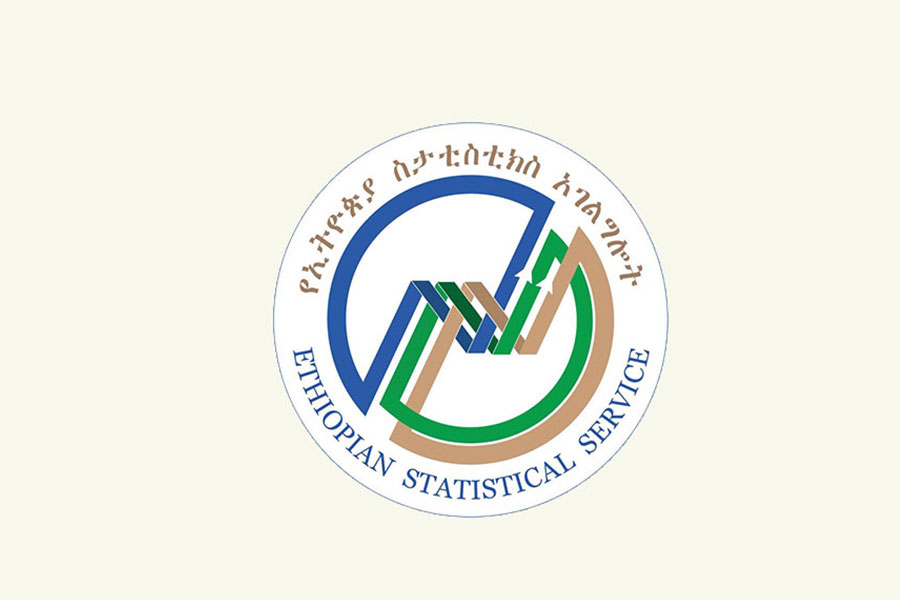
Radar | Sep 02,2023
Nov 7 , 2020
By FASIKA TADESSE ( FORTUNE STAFF WRITER )
The prices consumers pay for widely used goods and services rose by 19.3pc in October, marking one of the fastest paces, according to a report from the Central Statistical Agency (CSA). The year-on-year inflation rate has also shown a 0.6-percentage-point rise compared to the preceding month.
Gauged by the Consumer Price Index (CPI), headline inflation indicates the cost of living by measuring the average change in prices that consumers pay for a basket of goods and services. The survey shows that food inflation accelerated to 23.2pc, a rise of two percentage points. In contrast, non-food inflation came in at 14.4pc, a bit slower pace than the rate registered in September.
Most cereal prices continued to rise during the current month, which mainly tends to drive up food inflation, according to the Agency report.
"Besides the hike in the price of bread, injera, sugar, imported edible oil, potatoes, whole pepper and coffee during the current month has contributed to an increase in the rate of inflation," reads the report.
Maize, wheat, vegetables and some pulses registered a decrease in their price in October, according to the report.
The rise in non-food inflation is mainly due to a spike in the prices of alcohol and tobacco, khat, housing repair and maintenance, energy, medical care, and gold. Transportation costs have declined in the past month.
The month-on-month general CPI, which measured the price change between the two latest months, has shown an increase of 0.4pc compared to the preceding month.
Getachew Asfaw, an economist who has published four books on the macroeconomic conditions of the country, attributes the chronic inflation growth to a supply shortage and higher money circulation in the economy.
"Due to the higher inflation rate, the real income of citizens is declining," he said, "leading them to cut consumption."
Getachew also says that there are many people in the country with windfall income, where their income is highly dependent on seasonal businesses and activities.
Inflation, the foreign currency shortage and unemployment are the major problem of the present administration, which targeted to confine the headline inflation rate to the single digits at 9.8pc. This is despite the average 15.5pc rate that has been registered over the past decade and a half. Last fiscal year's rate was even higher than the 15-year average, which stood at 19.9pc, mainly driven by the growth of food inflation that registered a 23.3pc rate, while non-food inflation stood at 15.8pc.
Despite the efforts that have been made, inflation is still a headache for the macroeconomic team, according to Prime Minister Abiy Ahmed (PhD), who addressed members of parliament three weeks ago.
"Over the past three months, the index has shown a decline," said Abiy, "but it's not enough. We're working to identify the push factors."
Abiy said his administration has identified supply and logistical problems as causes for inflation. He also mentioned that his administration is working on land consolidation for farming and irrigation farming to increase agricultural productivity.
"It's not enough," he said, "the market chain and the logistics need to be improved and modernised."
The Ministry of Finance will also stop borrowing from the National Bank of Ethiopia (NBE), according to him.
During the first three months of the current fiscal year, the central bank has sold 33.4 billion Br worth of treasury bills (T-bill). The revenues were redirected toward the Finance Ministry to cover the budget deficit.
Abiy and the expert also attributed the latest demonetisation process to replace the banknotes that have been in circulation for the past 17 years as another cause that exacerbated inflation.
PUBLISHED ON
Nov 07,2020 [ VOL
21 , NO
1071]

Radar | Sep 02,2023

Radar | Nov 13,2021

Radar | Jun 21,2025

Viewpoints | Jun 05,2021

In-Picture | Mar 02,2024

Fortune News | Sep 21,2019

Commentaries | Aug 12,2023

Fortune News | May 20,2023

Fortune News | Feb 06,2021

Commentaries | Jun 15,2024

Dec 22 , 2024 . By TIZITA SHEWAFERAW
Charged with transforming colossal state-owned enterprises into modern and competitiv...

Aug 18 , 2024 . By AKSAH ITALO
Although predictable Yonas Zerihun's job in the ride-hailing service is not immune to...

Jul 28 , 2024 . By TIZITA SHEWAFERAW
Unhabitual, perhaps too many, Samuel Gebreyohannes, 38, used to occasionally enjoy a couple of beers at breakfast. However, he recently swit...

Jul 13 , 2024 . By AKSAH ITALO
Investors who rely on tractors, trucks, and field vehicles for commuting, transporting commodities, and f...

Jul 12 , 2025
Political leaders and their policy advisors often promise great leaps forward, yet th...

Jul 5 , 2025
Six years ago, Ethiopia was the darling of international liberal commentators. A year...

Jun 28 , 2025
Meseret Damtie, the assertive auditor general, has never been shy about naming names...

Jun 21 , 2025
A well-worn adage says, “Budget is not destiny, but it is direction.” Examining t...